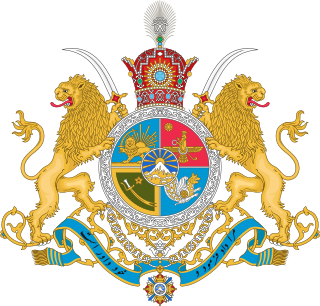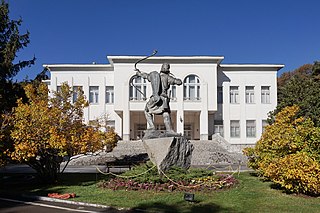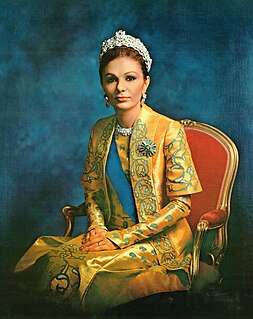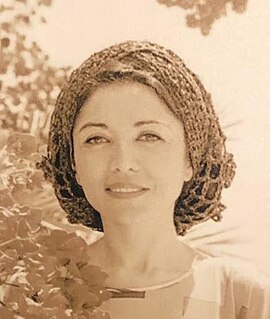
Reza Shah Pahlavi was an Iranian military officer, politician, and first shah of the House of Pahlavi of the Imperial State of Iran and father of the last shah of Iran. He reigned from 15 December 1925 until he was forced to abdicate by the Anglo-Soviet invasion of Iran on 16 September 1941. Reza Shah introduced many social, economic, and political reforms during his reign, ultimately laying the foundation of the modern Iranian state. Therefore, he is regarded as the founder of modern Iran.

The Pahlavi dynasty is the last Iranian royal dynasty, ruling for almost 54 years between 1925 and 1979. The dynasty was founded by a non-aristocratic Mazanderani soldier in modern times, who took on the name of the Pahlavi language spoken in the pre-Islamic Sasanian Empire in order to strengthen his nationalist credentials.

The Sa'dabad Complex is a 110 hectare complex built by the Qajar and Pahlavi monarchs, located in Shemiran, Greater Tehran, Iran. Today, the official residence of the President of Iran is located adjacent to the complex.

The Prime Minister of Iran was a political post that had existed in Iran (Persia) during much of the 20th century. It began in 1906 during the Qajar dynasty and into the start of the Pahlavi dynasty in 1923 and into the 1979 Iranian Revolution before being abolished in 1989.

The Party of Resurrection of the Iranian Nation or simply Rastakhiz Party was Iran's single legal political party from 2 March 1975 until 1 November 1978, founded by the Shah Mohammad Reza Pahlavi.
Aryamehr was the title used in the Pahlavi dynasty by Shahanshah Mohammad Reza Shah of Iran. It means Light of the Aryans.

Ashraf ol-Molouk Pahlavi was the twin sister of Mohammad Reza Pahlavi, the last Shah of Iran (Persia), and a member of the Pahlavi dynasty. She was considered the "power behind her brother" and was instrumental in the 1953 coup that overthrew Prime Minister Mohammad Mosaddegh in favour of strengthening the monarchical rule of the Shah. She served her brother as a palace adviser and was a strong advocate for women's rights. Following the Iranian Revolution in 1979, she lived in exile in France, New York, Paris and Monte Carlo and remained outspoken against the Iranian Islamic Republic.

Arteshbod Gholam Reza Azhari was a military leader and Prime Minister of Iran.

Mohammad Reza Pahlavi, also known as Mohammad Reza Shah, was the last Shah (King) of the Imperial State of Iran from 16 September 1941 until his overthrow in the Iranian Revolution on 11 February 1979. Due to his status as the last Shah of Iran, he is often referred to simply as the Shah.

Corruption is a serious problem in Iran, being widespread, mostly in the government.

Farah Pahlavi is the widow of the last Shah of Iran, Mohammad Reza Pahlavi, and was successively Queen and Shahbanu of Iran from 1959 to 1979. She was born into a prosperous family whose fortunes were diminished after her father's early death. While studying architecture in Paris, France, she was introduced to the Shah at the Iranian embassy, and they were married in December 1959. The Shah's first two marriages had not produced a son—necessary for royal succession—resulting in great rejoicing at the birth of Crown Prince Reza in October of the following year. Diba was then free to pursue interests other than domestic duties, though she was not allowed a political role. She worked for many charities, and founded Iran's first American-style university, enabling more women to become students in the country. She also facilitated the buying-back of Iranian antiquities from museums abroad.

Gholam Reza Pahlavi was an Iranian prince and a member of the Pahlavi dynasty, as the son of Reza Shah and half-brother of Mohammad Reza Pahlavi, the last Shah of Iran.

Abdul Reza Pahlavi was a member of Iran's Pahlavi dynasty. He was a son of Reza Shah and a half-brother of Mohammad Reza Pahlavi.

Fatemeh Pahlavi was Reza Shah Pahlavi's tenth child and half-sister of Mohammad Reza Pahlavi. She was a member of the Pahlavi dynasty.

The Foundation for Iranian Studies is an American non-profit institution founded in 1981 in Washington DC, and later moved to Maryland, dedicated to educating the public about Iran/Persia. Since 1982 they host an oral history program. The director of the foundation is Mahnaz Afkhami, former women minister in Iran.

Hassan Alavikia was a general and businessman in the Pahlavi pre-revolutionary government of Iran. Along with Teymur Bakhtiar and Hassan Pakravan, he was a co-founder of the SAVAK.

Hamid Reza Pahlavi was Reza Shah's eleventh and last born child, and a half-brother of Mohammad Reza Pahlavi, the last shah of Iran.

Mahmoud Jafarian was an Iranian politician under the last Shah of Iran, Mohammad Reza Pahlavi. He served simultaneously as deputy director for National Iranian Radio and Television (NIRT), managing director of Pars News Agency, and Vice President of the Rastakhiz Party.
Parviz Nikkhah was an Iranian communist politician and one of the central leaders of the Confederation of Iranian Students (CIS). While studying in Europe, Nikkhah founded a Maoist splinter group of the Tudeh Party that emphasized armed struggle, being arrested for his revolutionary activities after returning to Iran. While in prison he became a supporter of the Shah and was subsequently released, later being executed during the Iranian Revolution for his collaboration with the Shah's government.
Javad Bushehri, also known as Amir Homayun, (1893–1972) was an Iranian businessman and statesman who held several government posts. In addition, he served at the Majlis and Senate and also, was the governor of the Fars province.
















